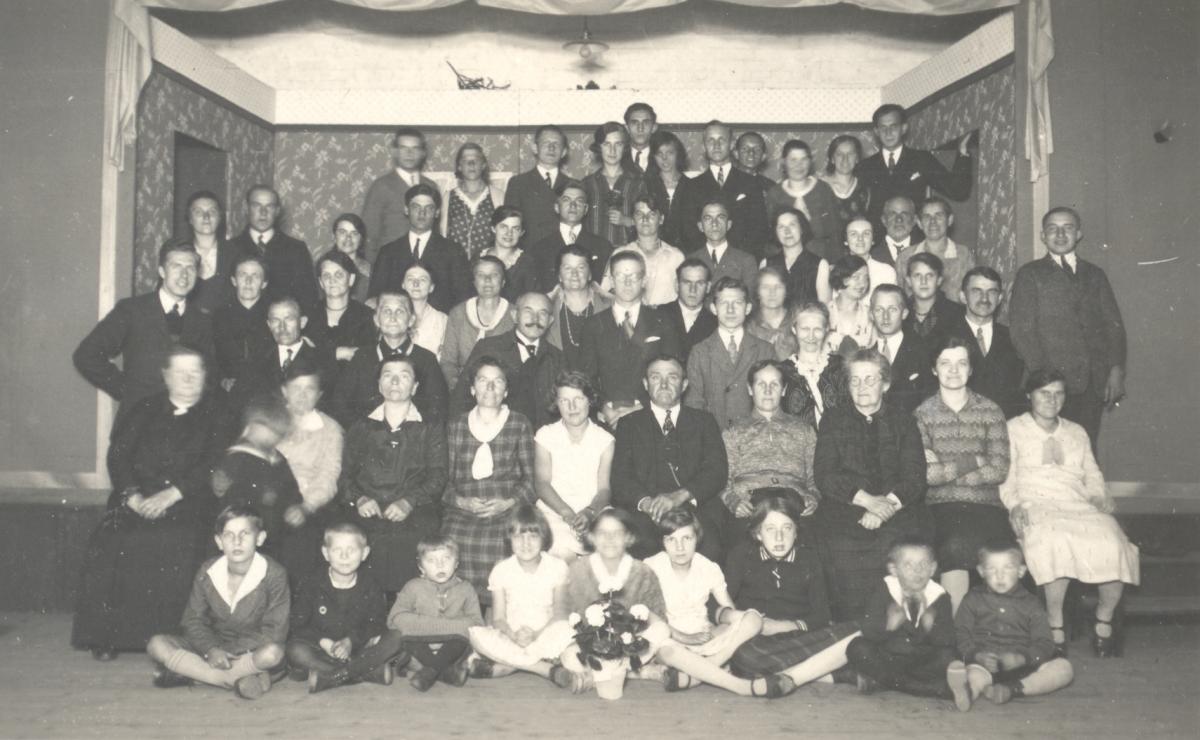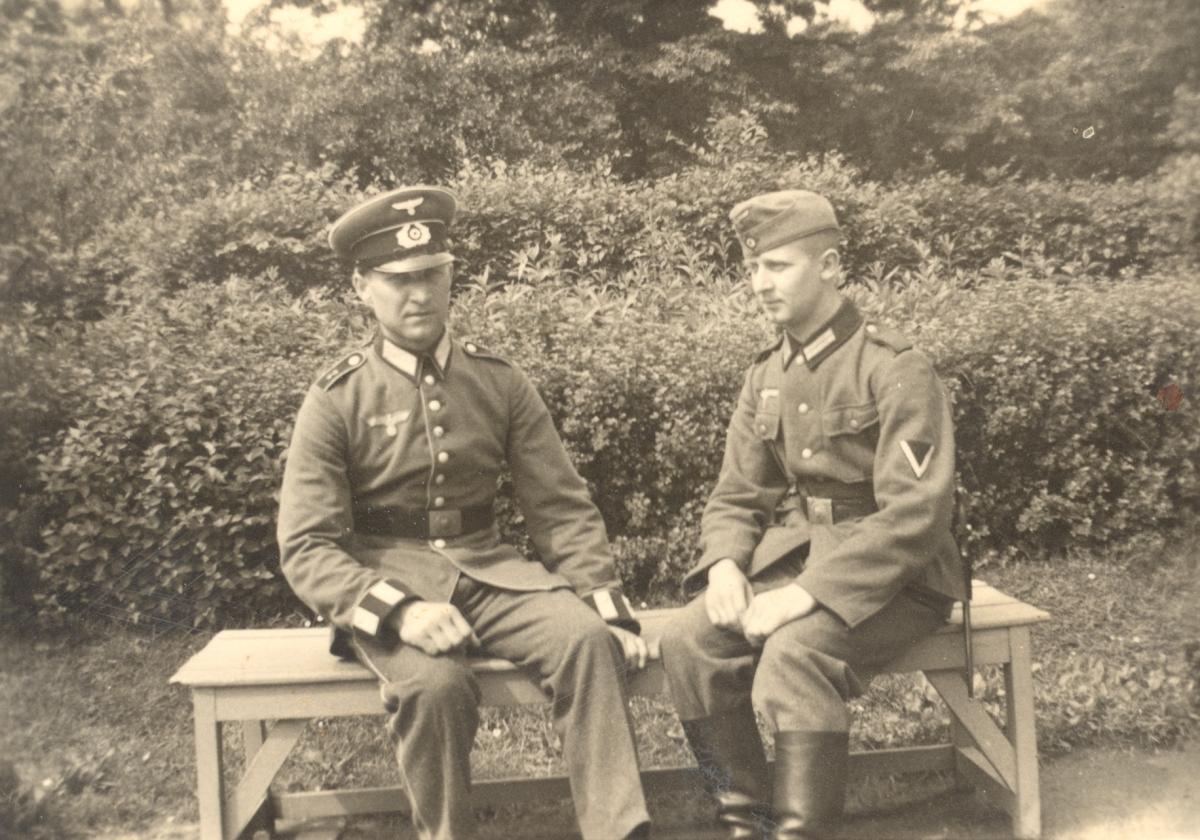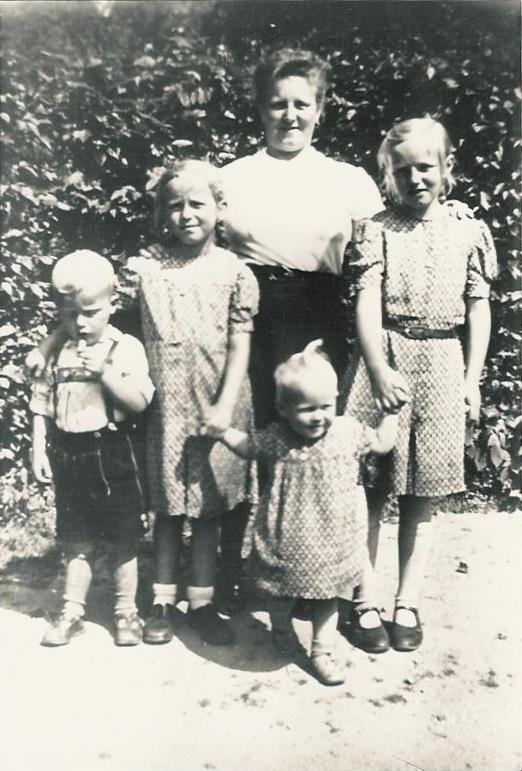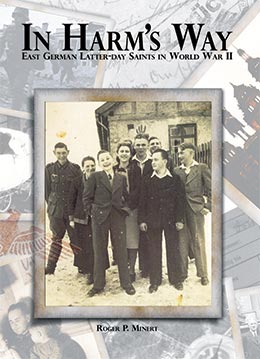Schweidnitz Branch, Breslau District
Roger P. Minert, In Harm’s Way: East German Latter-day Saints in World War II (Provo, UT: Religious Studies Center, Brigham Young University, 2009), 145-51.
The city of Schweidnitz is located about twenty-seven miles southwest of Breslau. Prior to the war, the town had a population of about 35,000 people, the majority of whom were Catholic. The Latter-day Saint branch there met in rented rooms in a factory building at Bauhofstrasse 3. As in most branches in Germany, Sunday School started at 10 a.m. and sacrament meeting was held in the late afternoon or evening. According to Christa Zietz (born 1935):
| Schweidnitz Branch[1] | 1939 |
| Elders | 6 |
| Priests | 3 |
| Teachers | 1 |
| Deacons | 8 |
| Other Adult Males | 12 |
| Adult Females | 50 |
| Male Children | 10 |
| Female Children | 9 |
| Total | 99 |
We had the whole upstairs floor. One large room was used for sacrament meetings and another large room for recreation. There were also other smaller rooms and closets. There were [usually] between thirty and forty people in attendance. . . . We always had a picture of Jesus. And one thing I remember very well: in front of the pulpit there was writing which said “The Glory of God Is Intelligence.”[2]
From the recollections of Ursula Anders (born 1920):
It took about an hour to get to church, which we did twice each Sunday. Even in bad weather. Sometimes I got to church soaked to the skin. I could take my bike to church during the week but not on Sundays.[3]
The Schweidnitz Branch consisted of just a few large families. The surnames Anders, Burkert, Heilich, Köhler, König, Pöpel, Radon, Schöfer, and Zietz were well represented there.[4]
 The Schweidnitz Branch shortly before the war. This photograph was taken in the cultural hall. (C. Zietz Simmons)
The Schweidnitz Branch shortly before the war. This photograph was taken in the cultural hall. (C. Zietz Simmons)
Ursula Anders had never joined the Hitler Youth. “None of my siblings did. It just wasn’t our thing,” she recalled. On September 1, 1939, war broke out. Ursula expressed her reaction to the news in these words:
I was surprised to learn that Germany had attacked Poland. I was in the store when I heard that our army had marched into Poland. We had no warning. Then it was over in sixteen [twenty-one] days. I thought it was horrible.
Ursula’s father was a blacksmith at the army post in Schweidnitz and was never drafted into the army. The family lived at Schlageterstrasse 20, about an hour’s walk from the Church. Fortunately, the home was not damaged during the war.
Christa Zietz’s father, Walter, was drafted in 1940. “It was frightening to know that my father was in harm’s way,” Christa recalled, “He came home twice, and the third time he promised that he would come home when I started school (first grade), but he did not make it.” Brother Zietz was only thirty-two years old when he was killed in battle just outside Moscow, Russia, on March 4, 1941.
 Walter Zietz (left) and his brother Adolf in about 1940. Walter was killed near Moscow. (C. Zietz Simmons)
Walter Zietz (left) and his brother Adolf in about 1940. Walter was killed near Moscow. (C. Zietz Simmons)
According to the prevailing custom for mourning a family member, Wilhelmine Zietz was expected to wear black for one year. “I think my mother went longer,” recalled Christa. In an attempt to cope with her grief, she took her two young girls to a forest ninety minutes distant to pick wild strawberries, raspberries, blueberries, and mushrooms. On one unforgettable occasion, they were next to a huge oak tree that was suddenly struck by lightening and burst into flames. Terribly frightened, they were nevertheless saved by their “Heavenly Father’s protection” (according to Christa).[5]
The Schweidnitz Branch experienced both member and convert baptisms during the war. “My baptism was on October 4, 1940, in the forest, at 8 p.m.,” recalled Walli Pöpel (born 1933). Her story continued:
It was at a reservoir outside of town. There were about ten of us and one adult [to be baptized]. [The adult] went into the water but came out fast because it was too cold for him. I thought he was a chicken and I said so, so I was the first. There were some sharp stones below and it hurt. But when I came out of the water, I felt so clean and so peaceful and that I was a good person. From then on I was not going to cause my mother any problems (but that didn’t last long!). Then we had a towel wrapped around us, and we walked all the way home, several miles.[6]
As part of their calling as “town missionaries,” Elders Köhler and Burkhardt (members of the Schweidnitz Branch) knocked on the door of the Neumann family in 1941. Ilse Neumann was at home with her six children and sent the men away. However, they returned a few weeks later, and this time, Frau Neumann listened to their message. Her husband, Werner Bruno Neumann, was one-half Jewish and did not join the Church. Ilse was baptized with their two eldest children, Ingeborg and Horst, later that year. In 1942, daughter Brigitte (born 1934) was baptized. She recalled the event in these words:
When we all walked to the baptism, I was so excited. My mother was there and the [Church] brother who wanted to baptize me. It started raining, and I became angry and did not want to go through with the procedure anymore. The brother took his coat and put it around me because he knew how I felt. I wanted it to be the most beautiful day, and it was raining. I was baptized in the Weisstritz River. It was very cold, [but] as soon as I came out of the water, everything was different—I felt warm and welcome.[7]
Ursula Anders had finished school and completed an apprenticeship as a salesperson before the war began. She also participated in a course with the Red Cross and was a busy young lady when she became engaged to a soldier:
I married in October 1942. He was Herbert Jagusch, a nonmember. We had a wedding dinner at home. My grandfather was there and siblings of my husband. We had a big dinner that we fixed ourselves. The wedding was in the civil registry office; nothing was done at church. Six months later (March 1943) he was killed in Russia. . . . We had no children. I was informed by a soldier who brought a letter from my husband’s commanding officer. My husband was a messenger and was constantly moving up and down along the lines.
“It is indescribable being a widow after just six months,” she explained. “I had told my husband about the Church, and he said that he would attend when he came home.” Despite this devastating loss, during her year of bereavement, Ursula moved on with her life and became a full-time nurse, serving alternately in Schweidnitz and Breslau for the remainder of the war. Her memories of work as a nurse were vivid:
They brought soldiers to us straight from the field hospitals. At the front, they were given lots of drugs, then we had to stop that when they came to us. One guy was screaming for drugs, but my boss told me that we couldn’t give him any. So I gave him some placebo pills and his pain went away. I was gone for six months, then came back, and he was still there. He had my picture by his bed because he believed that I had healed him.
With the weapons of war ravaging the bodies of soldiers on many fronts, nurses needed nerves of steel to assist putting those bodies back together. It appears that Ursula Anders was up to the task: “I really enjoyed being a nurse. . . . It was not psychologically difficult to be around those men, because I could help them.”
Stationed in Schweidnitz on Christmas Eve 1944, Ursula was in a Catholic hospital working the night shift. As she later reported, “There was a chapel where ten men had been put up, and they wanted to have a Christmas Eve mass. One man there was from France. He was in a wheelchair, and they rolled him in. Then they took him out because they said that he didn’t belong there.” Some inappropriate attitudes prevailed even at Christmastime.
National Socialist attempts to raise youth loyal to the government did not wane during the war. For example, Walli Pöpel was inducted into the Jungvolk in 1943 at the age of ten, along with her classmates at school:
I really enjoyed the Jungvolk. I liked the marching, singing, and sports. We had competition in a large stadium. I excelled in every sport. In Schweidnitz we had a huge celebration and a local [Nazi] Party Jungvolk leader organized a huge stadium full of youth doing those routines with flags and ribbons.
Christa Zietz had no problems in school because of her religion. In fact, conditions were fairly pleasant for her in 1943:
I remember my second grade teacher very well. She was the wife of the pastor of the Protestant church in Schweidnitz. She was very nice and kind to me. Her daughter was my best friend. I remember we made a pact that I would go to her church with her one Sunday and the next Sunday she would go to my church with me.
Her friend’s elder brother appeared in church one Sunday and quietly observed a testimony meeting. Before leaving, he stated that he was very impressed and wished that he could feel the same way. He had simply come to see what his younger sister was experiencing.
Life in Hitler’s Germany in the early years of the war was still relatively good for millions of Germans but not for people such as Werner Neumann who had one Jewish parent. His daughter, Christa (born 1938), later recounted some of his trials during the war:
Our father had to wear the Jewish star, and he was often taken away from home. In those cases, my mother and Brother Heilig [the branch president] went and got him out from wherever he was. He was also often fired from his job, and it was difficult for him to find new work. People put an earring in his one ear because they wanted to make fun of him. The day our father was supposed to get baptized, he was sent into the water to find a deep spot that would work for his height. He could hardly breathe because of his heart condition, and they let him out again. Several times, they tried to baptize our father but there was always something that went wrong.
Frida Pöpel was left with four little children, when her husband, Herbert, went off to war. According to their daughter, Walli:
My father was unemployed since 1933 or 1934, so when the war started, he was drafted right away. He was in the air force. [During the war] we would see him once a year for a few days, then we took him to the train station to say good-bye, and we never knew if he would be coming back.
Räder müssen rollen für den Sieg! (Railroad wheels must roll to victory!) was the slogan of the German national railway system in World War II. However, that was only part of the story. Another part was the enormous relief effort needed to care for people on the long train ride west, as millions tried to evade the oncoming Soviets. Walli Pöpel and her Jungvolk friends were recruited to help feed the refugees streaming through Schweidnitz. She later described her work in these words:
I worked at the train station to make sandwiches for the refugees. We made them in a big hall, using the Kommissbrot [dark army bread], and it was hard to chew. We made them and put them in baskets; then we went through the neighborhood to hand them out. Because we went down our own street, we stopped in our homes and gave some sandwiches to our family. And I ate one myself and ate a bit while we were making them. I was really hungry. That was in January 1945.
During the last months of the war, the conflict was coming ever closer to the relatively quite town of Schweidnitz. Christa Tietz recalled one specific incident clearly:
Our city was bombed heavy every day; we practically lived in the basement of our house where the bomb shelter was located. . . . I remember one Sunday, we had been to church, all had been calm, and we were sitting down to eat our Sunday dinner when there was a lot of noisy crashes, and flames of fire appeared outside our living room windows. The house was shaking, and we had a hard time going down into the bomb shelter. We had to hold on to the banister very hard or we would have fallen down the staircase. At first we thought that we had been hit, but we found out later that a house across the street had been hit instead. It felt like the end of the world had come. It was a surprise attack; it happened without any warning.[8]
Ursula Anders was in Breslau when the word came that the invaders were about to surround the city. She later described the attempts made by the hospital personnel to evacuate patients from the city:
We had to carry them (several were amputees) a long way to the railroad station. We saw a train that was reserved for officers, but I said, “We are putting our wounded on that train, and the officers can wait.” When we were done loading the wounded, there was no room for the officers!
That train was the last to leave Breslau before the city was surrounded. Arriving in Berlin late that night, they survived an air raid. Ursula had gained a few months’ time before the war would catch up to her again.
Frida Pöpel took her four children and fled Schweidnitz on January 17, 1945. According to her daughter, Walli,
We went to the train station. Our friends had a fourteen-year-old son who was supposed to stay and fight with the Volkssturm, but we put him in woman’s clothing, and he climbed over the fence to get on the train. We got fourteen people in the compartment. We were so crowded that the little children slept up above in the luggage racks.[9]
Sister Pöpel and her four children rode the train from Schweidnitz southeast to Prague. Walli explained what happened next:
The city [of Prague] was overflowing, so [officials] gave us some bread and water and sent us on to Nuremberg [Germany]. But that city was also overflowing, so we went on to Regen in the Bavarian Forest, where they put 200 of us in a school auditorium. There my mother had her fortieth birthday on February 22. It took us that long [since January 17] on the train without any bathing or washing. We did not change trains. Our train made it safely through while two other trains [of Schweidnitz refugees] were attacked by airplanes. We had plenty of Mormons in our train; they were all Schweidnitz Branch people. The branch ceased to exist when we left.
Frida Pöpel and her children ended up in the small Bavarian town of Abtschlag—seven miles from the German-Czech border. Living and working on a farm, they had no idea whether Herbert Pöpel was still alive. Fortunately, Walli could later tell of their reunion:
My father found us in Abtschlag when he came home in 1947. He hadn’t seen us for three years. He found us through the Red Cross. . . . He had eaten better as a POW in France than we did [in Germany]. He drank wine even for breakfast. When he saw how we were starving and living in Germany with piles of destruction all around us, he wanted to take us and go back to France.
According to Christa Neumann, her family left Schweidnitz on February 23, 1945:
We left together with many people from the branch. We had already tried to leave our homes before, but then we went back. [That] morning, we [Saints] all met. Some of the families from the branch were already gone and used other opportunities to leave the city. The first thing we did was to say a prayer together. Then, we walked to Kreuzwitz, a small place, because our [Schweidnitz] train station was destroyed and no train left from there. We waited for a long time, and it was very cold.
When they finally boarded the train, they were taken into Czechoslovakia. After a few weeks of confusion and partial starvation, the Neumanns (miraculously, an intact family) arrived in the large city of Plzen in western Czechoslovakia. The war was nearly over, and they were all imprisoned by the Czechs. For three weeks, they huddled in a small cell with forty other persons. Werner Neumann was then separated from his family, and Ilse was required to work in a nearby hospital. The children suffered from lack of food. Then the Americans (who had arrived in Plzen in late April) came to move them to another facility.
On her tenth birthday, April 21, 1945, Christa Zietz and her family were also evacuated from Schweidnitz. They traveled on a regular passenger train going south to the border of Czechoslovakia, where they were moved into a cattle car for the next phase of the trip. Then began what Christia would later call “that horrible journey through hell”:
We were hated and persecuted, chased from one place to another, cubed up in pigpens and shot at [by partisans], exposed to the elements in bitter cold weather, where many people were physically abused and killed. Only through the protection of our Heavenly Father were we spared from that evil. We were starving and had to beg for food and water constantly.[10]
Christa’s sister (four years younger) had broken her arm during the trip, and the family was nearly separated when Sister Zietz left the railroad station to find medical treatment for her daughter.
On April 21, the day the Zietz family left for Czechoslovakia, Ursula Anders was still in Berlin. It was on that day that the word went out that the invaders were ready to complete their encirclement of the Reich capital. Ursula counted herself blessed to find a spot on a truck heading west. For the next two weeks, she and other refugees wandered west toward the Elbe River—sleeping in barns and begging for food. However, she found it impossible to cross over into what was believed to be friendlier occupation territory because the Soviets were carefully guarding the river. Eventually, an English truck gave her a lift across the river. From there she found transportation to Hamburg, but the city was devastated and its survivors were living in basements. Ursula moved on north to Elmshorn, where she found a budding new branch of the LDS Church.
Just over a month after the war ended (June 1945), the Zietz family was sent home to Schweidnitz. They took a train to the border and then walked the rest of the way—about fifty miles. Shortly after their arrival, Christa and her grandmother were diagnosed with typhoid fever, to which the older woman succumbed on June 28. Wilhelmine Zietz was desperate to have her daughter hospitalized but had no money. One day, she was pushing ten-year-old Christa in a baby buggy toward the hospital, intensely praying about her need for money. “All of a sudden, she noticed something lying on the ground, and when she picked it up it was a wallet with exactly the amount of money in it that was needed,” Christa later wrote.[11]
 Frida Pöpel was forced to flee Schweidnitz with her four children in January 1945. (W. Poepel Sanger)
Frida Pöpel was forced to flee Schweidnitz with her four children in January 1945. (W. Poepel Sanger)
In the summer of 1946, the Zietz family members were required to either become Polish citizens or leave the country. They had already been thrown out of their apartment at Markt 14 at a moment’s notice, losing most of their possessions. For this reason alone, it was not difficult to join with all of the surviving members of the Schweidnitz Branch in the decision to be deported to Germany. They were shipped to the East German town of Döbeln, Saxony, where there was already a branch of the Church ready to take them in.
In June 1945, Ilse Neumann and her children were transported from Plzen, Czechoslovakia, west across the border into Germany. They were placed in the town of Windischeschenbach, just ten miles from the Czech border in the state of Bavaria. However, Werner Neumann was detained in Plzen and was never seen again. In 1948, the last of several inquiries was answered: Werner Neumann had died in a Plzen prison in 1946.
Ursula Anders’s parents also chose deportation to Germany. They ended up in the town of Treuenbrietzen, north of Berlin, where their daughter did not see them again until 1947. By then a veteran army nurse and a young widow, Ursula looked forward to a better life after the war. For more than two years she had been mostly isolated from the Church: “I never saw Mormon soldiers in the hospitals. When I was not on duty (which was rare), I went to church in Breslau. I had a Book of Mormon with me until I fled Breslau.” Through it all, she had remained faithful to the Church.
Almost all of the members of the Schweidnitz Branch made it safely west to what remained German territory. By the fall of 1946, the Latter-day Saint branch in Schweidnitz, Germany—renamed Swidnica, Poland—had ceased to exist.
In Memoriam
The following members of the Schweidnitz Branch did not survive World War II:
Herbert Jagusch m. 1942; k. in battle 1943. (Anders-Adolf)
Rosalie Emma Schoefer b. Riegersdorf, Neustadt, Ober-Schlesien 1 Feb 1905; dau. of Karl Schoefer and Anna Pauline Huhndt; bp. 27 Sep 1924; d. 1942. (Zietz-Simmons; IGI)
Walter Karl Emil Zietz b. Berlin, Brandenburg, Preussen 6 Feb 1909; son of Emil Karl Zietz and Elfriede Johanna Klara Eckstein; bp. 26 Jun 1927; m. Schweidnitz, Schlesien, Preussen 4 Oct 1932, Wilhelmine Pauline Huhndt; 2 children; k. in battle Moscow, Russia 4 Dec 1941. (Zietz-Simmons; IGI)
Notes
[1] Presiding Bishopric, “Financial, Statistical, and Historical Reports of Wards, Stakes, and Missions, 1884–1955,” CR 4 12, 257.
[2] Christa Zietz Simmons, interview by the author, Manti, Utah, October 8, 2006.
[3] Ursula Anders Wolf, interview by the author in German, Augsburg, Germany August 7, 2006, summarized in English by Judith Sartowski.
[4] List, comp. Christa Zietz Simmons, 2006 (unpublished); private collection.
[5] Christa Zietz Simmons, “Biography of Wilhelmine Pauline Huhndt Zietz,” 2 (unpublished history); private collection.
[6] Walli Pöpel Sanger, interview by the author, Provo, Utah, June 19, 2008.
[7] Brigitte Neumann, Christa Neumann and Ursula Neumann McKell, interview by Marion Wolfert in German, Salt Lake City, May 15, 2006, summarized in English by Judith Sartowski; transcript of interview in author’s collection.
[8] Christa Zietz Simmons, interview.
[9] The standard passenger compartment in those days accommodated six persons.
[10] Christa Zietz Simmons, “Biography,” 2.
[11] Ibid.
